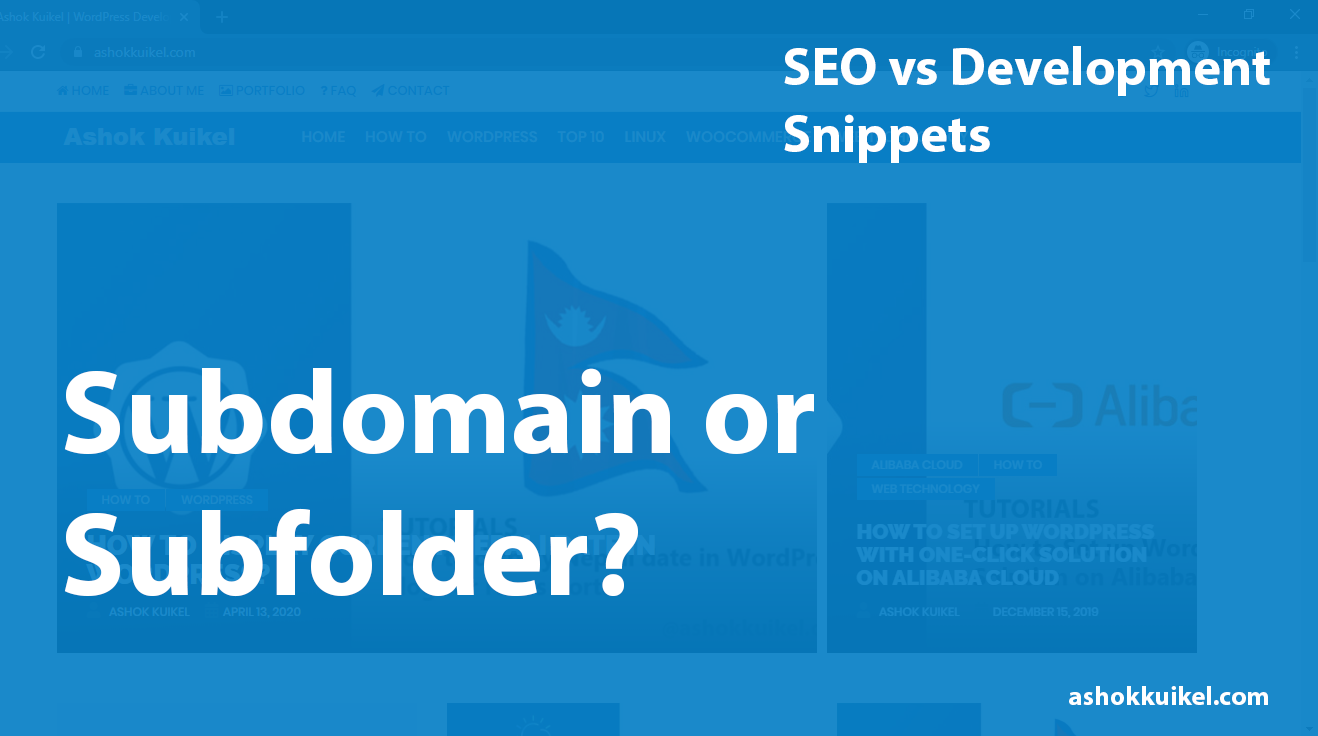Subfolder vs subdomain : Which Is Better for SEO & Why?
Subdomains and subfolders both have advantages and disadvantages. Find out whether subdomains or subfolders are the better SEO or development option for you.

What is better for SEO: A blog hosted on a subfolder or a subdomain – and why?
Search Engine Optimization(SEO) is a fast-paced and dynamic field. It can also sometimes be frustrating, especially if you’re relying on outdated tactics that no longer work.
That’s why it’s crucial for you to stay well-informed and learn continuously.
SEO is also more complex than ever in 2020.
It takes more than just building links, creating any old content, and adding a few keywords to improve your organic search rankings and increase the visibility of your business or brand.
Google hasn’t helped answer this question by making highly generalized statements.
Subdomains vs. Subfolders: What Google Says
According to Google, they treat subdomains and subfolders equally.
Google crawls, indexes, and ranks subfolders or subdomains exactly the same way.
The core point is, you have just as much ability to get a subdomain ranked as you do to get a subfolder ranked.
This is absolutely true.
Why SEO Pros Don’t Agree?
So why do so many SEO pros disagree on this?
It’s all about the effort involved.
While you can get either ranked, the effort it takes to get a subdomain to rank is often much higher.
Let’s start with a basic explanation of how domains work:
- A top-level domain (ashokkuikel.com) is purchased from a registrar.
- The registrar provides the right to the domain.
- To host a website on the domain, you have to pay a web hosting company (or be your own host) to connect that domain to an FTP server, which holds the content you want shown on that website.
This is an oversimplified explanation, but you’ll soon see why it matters.
Once you connect that domain to content on a server, you’ll be presented with a choice.
- Do you want the content to be on a subdomain, (e.g., www.ashokkuikel.com)?
- Or do you want it to be on the top-level domain, (e.g., ashokkuikel.com)?
If you choose the former, which most sites do, your content is already on a subdomain.
Because some sites choose to place dramatically different content on subdomains, Google treats each separate subdomain as its own entity.
What is the best approach ? Why?
I got involved in a discussion about using subdomains vs subfolders.
Say I want to create a new section on my website, dedicated to selling web hosting.
The web hosting part of the website would be pretty big, with its own application to manage the e-commerce.
I could add this on my website in two ways. The first is by using a subfolder, like this: ashokkuikel.com/webhosting.
The second is by using a subdomain, for example webhosting.ashokkuikel.com.
There is a third option, which is using its own domain name, like ashokkuikel.com. But let’s focusing on keeping our original domain.
A subdomain makes things easier to manage: you have your own completely separate app or CMS or anything, you store it separately in its Git repository if that’s what you use for CI/CD, and you can also host it separately on its own hosting.
I think it’s the ideal solution when you are using an external service like Shopify or anything, as they let you use a subdomain.
A subfolder on the other hand is a bit more complicated because unless you come up with creative ways on the server side (which implies you need to manage your own server), the code must all be put under the original code that manages the main domain.
There is a huge advantage, however, that moves the bar toward the subfolder approach in terms of SEO.
Google does not officially confirm it, but it considers subdomains as completely different sites from the main domain.
webhosting.ashokkuikel.com would not inherit the SEO “securiy audit” that ashokkuikel.com might have. Having many subdomains will dilute the domain authority over multiple subdomains rather than centralizing it in the main domain.
This reason alone could justify using ashokkuikel.com/webhosting.
From the branding standpoint, I don’t personally think there are differences. It’s much better to have a separate domain, logo and design for a big project. But if it’s just an idea or something you want to test-drive for example, without investing time and effort into having a separate domain, then both subfolder or subdomain approaches will work fine.
Summary
If you want to do the work of building out separate entity profiles and link value for multiple subdomains, go right ahead. Google or any search engines really doesn’t care whether they rank subdomains or subfolders.
From my point of view if you are on a fully optimizing single site better to go subfolder and for bigger brands who want a blog as a separate entity and proper organization, subdomains could be perfect.


Leave a Reply
You must be logged in to post a comment.